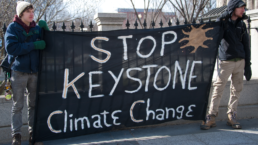It will be too little and too late to help alleviate oil prices.
By Adam Tomasi, People’s Policy Project
Republicans on Fox News and elsewhere have called for reviving the Keystone XL pipeline, which if completed would run 1,200 miles from Alberta, Canada to the Gulf Coast, in response to soaring gas prices following Russia’s invasion of Ukraine. Conservatives are using the present crisis to lambaste Biden’s decision last year to revoke Keystone XL’s permit, and his climate plans generally. Keystone may become a convenient symbol for the Right only because, following Biden’s new ban on US imports of Russian oil, the US needs to find a substitute for the 700,000 barrels per day that it previously purchased from Russia. But Keystone would have had virtually no effect on gas prices even if it could have been shipping oil tomorrow.
It’s important to note that this is purely hypothetical, because Keystone XL is very much dead. This January, a federal judge threw out red states’ lawsuit against Biden’s revocation of the Keystone permit because TC Energy (formerly TransCanada), the Canadian company responsible for the pipeline, has permanently cancelled any plans to build it. Quoting a report filed by the company, the judge for the Southern District of Texas stated that “no President would ever be able to issue another permit for the Keystone XL project—because it ‘no longer exists’.” But even if some version of a pipeline delivering shale from Alberta received a permit tomorrow, there are two reasons why this decision would not meaningfully reduce gas prices in the short or long term.

1. Timing
When TC Energy announced in March 2020 that it was resuming construction of the Keystone XL pipeline, they estimated that it would “enter service in 2023.” By this projection, if construction resumed tomorrow, Keystone wouldn’t be online until 2025. When Biden revoked the permit on January 20, 2021, TC Energy completed just over 90 miles of a pipeline supposed to extend across 1,200 miles. Considering this construction history and the inevitable lawsuits the pipeline would have faced again, completion in three years might be wishful thinking.
Recent Posts
These Veterans Starved Themselves To Protest The War In Gaza
July 8, 2025
Take Action Now As food in Gaza becomes increasingly scarce, activists are pushing their bodies to the limit in solidarity.By Emmet Fraizer, The…
ICE Agents Are Terrorizing Los Angeles With Brutal Tactics
July 8, 2025
Take Action Now ICE agents have established a pattern of brutal use of force in immigration raids.By Jonah Valdez, The InterceptSince June 6,…
Talk World Radio: India Walton On Zohran Mamdani And Freezing Out ICE
July 7, 2025
Take Action Now India Walton, former Democrat nominee for mayor of Buffalo, NY, discusses Zohran Mamdani and the race for NYC mayor and how to deal…
How Climate Change Is Worsening Flooding And Heavy Rainfall
July 7, 2025
Take Action Now The latest science on the link between climate change and natural disasters — and how they may be playing out where you live.By…




